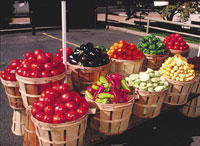A Word about Organics
What is organically grown food? Is it really better for people and planet? Some of us have been struck by how much better organic produce tastes and makes us feel. Not only are organic grains, vegetables, legumes, fruits, nuts, seeds, and dairy foods produced without petroleum-based fertilizers (which cause massive damage to ecosystems), carcinogenic pesticides and herbicides, hormones, or risky genetically modified organisms, but the organic system also helps preserve and promote biodiversity, closely follows natural cycles, supports family farmers by giving them livable incomes, reduces fossil fuel consumption, efficiently sequesters carbon, and improves soil fertility. If all the arable lands in the world were converted to organic production, the carbon reduction in the atmosphere would be akin to removing 3.5 billion exhaust-spewing cars from the roads! Cutting back on or entirely eliminating meat from the diet in combination with organic agriculture would restore life to our rivers and mitigate the growing dead zones in our oceans. We would reverse the catastrophic consequences of global warming. And our health would improve in the process.
 Soil fertility I one of our greatest legacies for posterity, for without good topsoil and sustainable farming practices, our precious planet cannot sustain life as we know it. The nonprofit Rodale Institute provide the results of decades of experimental research and the science to back the claim that not only is organic agriculture more productive and economically viable, but organic foods also contain significantly higher levels of nutrient density and antioxidants than their conventional counterparts –all without the toxic inputs.
Soil fertility I one of our greatest legacies for posterity, for without good topsoil and sustainable farming practices, our precious planet cannot sustain life as we know it. The nonprofit Rodale Institute provide the results of decades of experimental research and the science to back the claim that not only is organic agriculture more productive and economically viable, but organic foods also contain significantly higher levels of nutrient density and antioxidants than their conventional counterparts –all without the toxic inputs.
Healthier soil yields healthier, disease-resistant plants. The uptake of beneficial nutrients by plants imparts vigor to those who consume them. One can practice a compassionate diet and gradually incorporate organic foods into it for maximum benefit.
Consumers who purchase organic products are not just buying food which has not been covered in pesticides (the average apple may be sprayed up to 16 times with as many as 30 different pesticides) they are supporting a system that has the highest welfare standards for animals, bans routine use of antibiotics and increases wildlife on farms.
More and more people are turning to the vegetarian way of life. The health benefits alone provide insurance to the individual and his or her family while saving the health care system undue stress and expense. Refraining from consuming the flesh of animals, birds, and fish withdraws support from industries that are in many cases socially, morally, and environmentally reprehensible, while also reducing one’s environmental impact. It is also a humanitarian act that supports a shift in the world’s food distribution system, which currently leaves millions to starve unnecessarily.
Over the past decades, we have witnessed – at least in North America – many waves of dietary and health trends. One diet or regimen is popular for a few years, only to be replaced by another. While it’s true that becoming vegetarian because of the adverse environmental impact of raising animals for food may not in itself lead to a deep and lifelong commitment, we are living in times of growing awareness of the interconnectedness of all life, from both the scientific and spiritual perspectives, and those who connect the humane quality of understanding with the suffering of others – human or animal – are most likely to stay the course, to commit to a life lived from the heart and intelligence of compassion.

